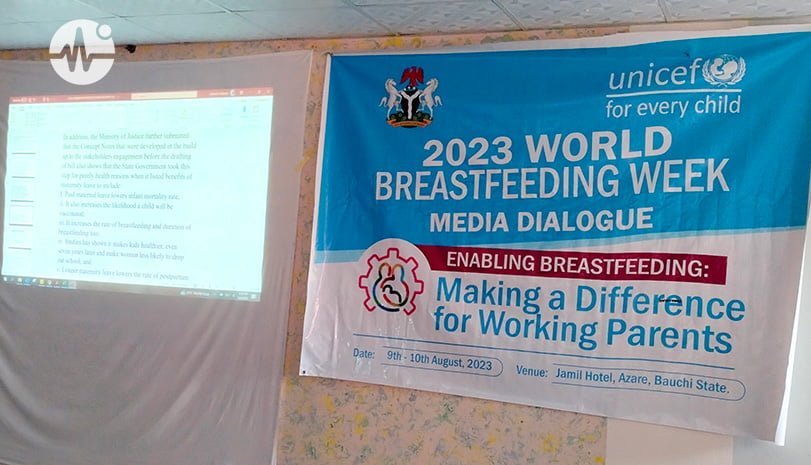The United Nations Children’s Fund (UNICEF) on Wednesday urged women to prioritize breastfeeding their babies, as this not only improves the overall health of their babies, but also reduces their risk of breast and ovarian cancers.
It stated that breastfeeding encourages uterine contractions, which helps in placenta expulsion, reduces uterine bleeding after birth, and helps the uterus return to pre-pregnancy size.
Lafiya360 reports that the global health body further disclosed that aside from preventing infections like diarrhoea, pneumonia, breastfeeding also prevents malnutrition and ensures food security for infants.
It, therefore, urged mothers to desist from giving water to children while breastfeeding, as the breast milk contains all that babies need to quench their thirst and satisfy their hunger. It contains 88 per cent of water; no need for additional water. Nutrients in breast milk are also more easily digested than infant formula.

UNICEF’s Nutrition Specialist, Philomena Irene, made this known in Bauchi State during a media dialogue on this year’s World Breastfeeding Week, with the theme: Enabling breastfeeding: making a difference for working parents.
She said, “Exclusive breastfeeding leads to fewer infections and less hospitalization and trips to the doctor. It decreases incidence of severe diarrhea, lowers respiratory infection. It reduces the risk of childhood obesity, and provides emotional bonding between mother and baby.
“It provides better eyesight, better IQ, lesser constipation, lower urinary tract infections, less allergy, better immune and respiratory system, and better circulatory system, among other benefits.
“Breast milk gives all children the healthiest start in life and offers life saving benefits for children and women. It is the first vaccine a child receives, and it affects health outcomes. It also stimulates brain development and affects educational outcomes.
“Breastfeeding infants leads to lowered healthcare cost because 50 per cent of infants’ illness is cut by 50 per cent with breastfeeding. It also produces healthier families, smarter workforce, and better economic productivity.
“Breastfeeding also protects women’s health because women who breastfeed their babies are less likely to come down with cancers – breasts, ovaries.
“Breastfeeding encourages uterine contractions, helps placenta expulsion, reduces uterine bleeding after birth and helps the uterus return to pre-pregnancy size.
“Breast milk contains all that babies need to quench their thirst and satisfy their hunger because it is 88 per cent water; therefore, there is no need for additional water.
“Exclusive breastfeeding leads to fewer infections and less hospitalization and trips to the doctor. It decreases incidence of severe diarrhea, lowers respiratory infection. Reduce the risk of childhood obesity. Provides emotional bonding between mother and baby.”
In his remarks, Dr. Tushar Rane, Chief, UNICEF’s Bauchi Field Office said, governments and employers to provide the needed assistance for mothers and caregivers, including those in the informal sector or on temporary contracts, to conveniently breastfeed or support breastfeeding.
He stated that they must promote policies that encourage breastfeeding, such as paid maternity leave for six months, as well as paid paternity leave, flexible return-to-work options, regular lactation breaks during working hours and adequate facilities that enable mothers to continue exclusive breastfeeding for six months. Also, working parents and caregivers need to have sufficient paid leave, with which they can meet the essential nutritional needs of their young children.
He said, “We understand that optimal infant feeding is a cornerstone for human capital development while poor Infant and Young Child Feeding (IYCF) practices bear major risks to child survival and socio-economic growth.
This year’s World Breastfeeding Week brings attention to workplace breastfeeding. Women make up 20 million out of the 46 million workforce in Nigeria; 95 per cent are within the informal sector, while the formal sector only employs 5 per cent.
“Shockingly, only 9 per cent of organizations have a workplace breastfeeding policy, with only 1.5 per cent in the public sector. Women in the informal sector have nearly no support for breastfeeding.
“Workplace challenges to breastfeeding are one of the primary factors responsible for early cessation of breastfeeding. Women require sufficient time and support to breastfeed successfully. For working mothers, juggling between tasks and breastfeeding may be nearly often impossible.
“Nigeria currently implements two maternity entitlement provisions. The first, which is recognized at all levels of public service and codified in the Nigerian Labour Act, provides up to 12 weeks of maternity leave with at least 50 per cent of salary and, upon return to work, half an hour twice a day during working hours to breastfeed.
“The second, recently adopted by the Federal Public Service and yet to be ratified by the states and local government civil service, is a 16-week maternity leave provision with full pay and two hours off each day to breastfeed up to six months after the employee resumes duty.”


